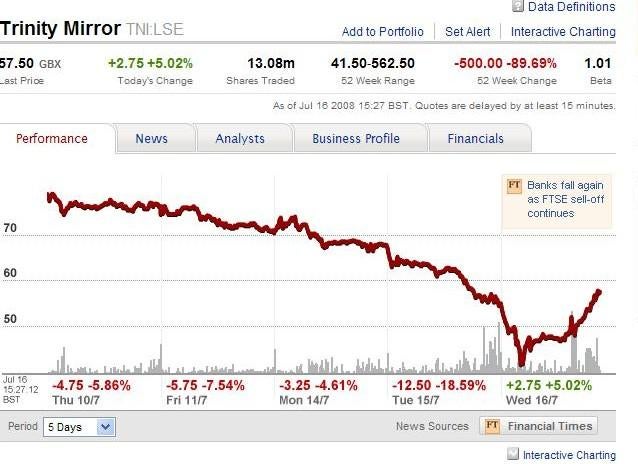
The demands of 24-hour rolling news and an “obsession” with user-generated material have hampered the media’s efforts to make sense of the global economic downturn, according to the BBC’s acting economics editor, Hugh Pym.
Speaking in a personal capacity at a Radio Academy debate on the credit crunch at City University in London, Pym said he was concerned that rolling news networks were too preoccupied with the rises and falls of the world’s stock exchanges to analyse the wider issues.
“The 24-hour news cycle creates an appetite for developing news. We tend to go slightly too hard on what the stock markets do,” he said.
“If the stock market is up 80 it doesn’t mean [the economy is] any better than it was yesterday. Being driven by the stock market is a problem and I’ve tried to urge them not to, with limited success.”
Pym also questioned the use of listener and viewer opinions to illustrate financial stories – and said relying on the audience instead of experts had become “too prevalent across the media”.
He added: “There’s a great obsession with what the audience think. Having a debate with somebody on-air who doesn’t know what the score is seems rather self-defeating.”
But Pym defended the BBC’s overall coverage of the credit crunch and said his colleague, business editor Robert Peston, had been “unjustifiably” accused of spreading panic with his exclusive report on the Northern Rock bank collapse last September.
Another speaker on the panel, financial PR John Wriglesworth, had claimed Peston had broken the story in a “completely hyped up” way.
“He obviously knew he’d got the scoop of the decade,” Wriglesworth said. “I think his nervous energy and excitement generated the fear.”
But Pym – who has taken the role of BBC economics editor while Stephanie Flanders is on maternity leave – said Peston “was doing no more than reporting that Northern Rock had gone to the Bank of England”.
“He’s been attacked, I think unjustifiably,” he said. “He was getting information into the public domain and that’s the role of journalism.”
Pym also defended the BBC’s decision not to report on last Friday’s edition of the News at 10 that troubled bank Bradford and Bingley was set to be nationalised – despite it making the splash in the early editions of Saturday’s Daily Mail and Daily Telegraph.
“It was pretty obvious that the regulator was looking at it, but we didn’t have any fact,” he said.
“We couldn’t just say that as a throwaway remark, because of the effect it would have on savers. We acted responsibly.
“We’ve often be accused of talking down the economy and putting out another gloomy old headline about unemployment. I would refute that.
“We report the figures as they are. A recession now is almost taken for granted – it is our duty to report that sensibly, factually and honestly.”
Email pged@pressgazette.co.uk to point out mistakes, provide story tips or send in a letter for publication on our "Letters Page" blog

